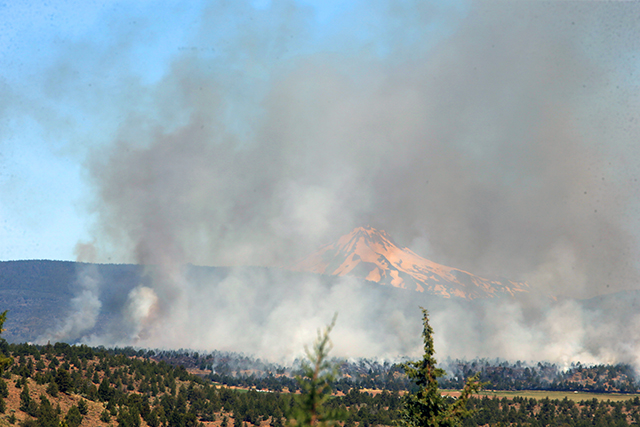Trail Angels aid Pacific Crest Trail hikers
Published 12:00 am Saturday, June 23, 2018

- Douglass
The short list of hikers’ trail names are memorable: Ping Pong, Awesome Opossum, Air Lift, Netflix, Fire Ant and Yard Sale. The volunteers who helped them during a trek through Cascade Range are memorable, too.
Trail Angels is a Central Oregon chapter of volunteers who make themselves available to those trekking 2,650 miles along the Pacific Crest Trail from Mexico to Canada.
“I love the whole mentality of the Trail Angels,” said Awesome Opossum, or Brad Mascal, who trekked the PCT in 2016. Throughout his five-month journey, he encountered about two dozen Trail Angels. Some would station themselves in remote areas. When hikers arrived, the angels, equipped with cooking gear, would whip them up egg breakfasts.
“They made some of the more trying days really pleasant,” said Mascal, 31, an architect-in-training who lives in Tuscon, Arizona. “You go through a lot on the trail. If it’s raining, you can be cold for a long time. But Trail Angels steer your spirits around.”
Mascal married his wife, Kate Callahan, two thirds of the way through his hike. She joined him at Crater Lake, where they held a ceremony, and then they hiked 200 miles to the trail’s intersection with the McKenzie Pass. There, Bend resident and Trail Angel Brian Douglass, 69, picked them up and took them to Bend for their honeymoon.
Positive interactions like these are what Douglass, also known as Uber Ducky, works to foster. And, as Central Oregon’s head Trail Angel, he’s looking for a few people to join the ranks.
“You have to be flexible to do what it takes,” said Douglass, adding that sometimes hikers need medical attention and require rides to appointments. “But people are very appreciative of the time I give them.”
Douglass became Central Oregon’s chief Trail Angel in 2015 after a close friend and longtime “trail superangel” Lloyd Gust died the year before at 86. Douglass’ bout with childhood polio prevents him from walking long distances, let alone hiking the PCT. Even so, Douglass and 11 other Trail Angels make themselves available to hikers during the height of thru-hiker season, which runs July until September. Most hikers begin at the Mexican border. By the time they reach Central Oregon, they often need to repair or replace gear, which may call for a ride to REI in Bend. Others are content with a shorter ride to Sisters where they can wash clothes and pick up a food box at the post office. Some Trail Angels offer up to two nights’ stay at their homes. Others prefer to offer rides and local expertise in exchange for gas money.
The Central Oregon Trail Angels chapter is loosely affiliated with other Trail Angel groups through the country and doesn’t have a website.
Hikers find Douglass’ contact information in “Yogi’s Pacific Crest Trail Handbook,” by Jackie McDonnell. After hikers make reservations with Douglass, he delegates to his team, some of whom have more time than others because they’re retired. Trail Angels doesn’t have a screening process for either angels or hikers. Potential volunteers should be willing to go the extra mile — or 100 — to help hikers through good times and bad.
Sometimes unanticipated events throw a wrench in angels’ plans. The 2017 Milli Fire, which caused hikers to circumnavigate the fire, is one example. That meant Douglass and others made six hour round-trip drives.
“You should definitely be ready to put six hours in — not just one,” Douglass said with a laugh.
Trail diplomacy
Stella Dean learned about Trail Angels in a 2014 Bulletin obituary for Gust. Dean lives in Sisters, where she often sees Pacific Crest Trail hikers. Sometimes they look like they could use some help.
“I figured it would be a good service for people who needed it,” said Dean, 71, who said she has helped 25 to 30 hikers since she got involved in 2015. “And I’m retired, so I have the time.”
Although she normally sticks to day hikes, Dean knows firsthand about the virtue of wilderness’ solitude, having once spent 11 days in the South Sierra Wilderness with friends.
“It was gorgeous,” she said.
In Sisters, Dean once noticed a young woman wearing a large backpack. She was carrying a box to the post office, which Dean knew was closed that day.
“I had the sense that she might need some help,” Dean said.
In helping her with the box, Dean learned that the woman, in her early 20s and visiting from Germany, had developed a back problem along the PCT in the Sierra Nevada Range that required her to be airlifted to a Sacramento hospital. There she stayed with a nurse’s family, who took her in for a month while she received physical therapy. When Dean met her, she had returned to the PCT with the intention of making it to Cascade Locks. Then, she would return to the Sacramento family for another month while she received more therapy.
“She had a very good feeling about how she was treated in this country,” Dean said. “By being a Trail Angel, you have the ability to provide a good service to people and be an ambassador for this country. They leave with the feeling they’ve been taken care of.”
Dean has also helped hikers from Switzerland and Japan. Dean receives notifications from Douglass about pickups. She then contacts the person directly via email, which some thru-hikers can access with satellite-enabled phones.
In way of compensation, Dean declines gas money but asks for permission to take casual photos on her smartphone. Each photo is different. Backdrops range from the PCT to REI in Bend. When she picked up one Kentuckian hiker who went by the trail name Diesel on the McKenzie Pass, he asked Dean to take him straight to the McDonald’s in Sisters. Diesel, a 20-something wearing a beard and a bandanna, wolfed three meals — breakfast, lunch and dinner — in one sitting. When he was doing laundry at Dean’s house, he told her how much his appetite surprised a McDonald’s employee.
“He had been dreaming about McDonald’s for a long time,” she added.
Dean has met hikers who became friends on the trail, such as a recent pair in their 60s. Dean is impressed by the number of PCT hikers she meets who are nearing or have entered retirement age.
“They’re dedicated,” she said.
Most hikers respect the limits of Trail Angels’ generosity, Dean said.
“Nobody has asked me for anything beyond willingness to do,” Dean said.
Never a bad funk
Sisters resident Mary Ryan, 51, has volunteered as a Trail Angel since 2014. Ryan has hiked daylong sections of the PCT. A former U.S. Army specialist, Ryan said a service-connected injury prevents her from making multiday hikes. Her motives for becoming a trail angel were straightforward.
“We’re just, you know, supposed to help people,” she said with a laugh. “I think of my kids, if they would ever be in a position where they would need a lift or a ride, that somebody out there would safely do it. I never worry about who I’m picking up at the other end because they’ve had to go through all the connections to get to me. It’s safer for them and not so random as hitchhiking.”
Some hikers set off for the PCT while dealing with personal crises. Ryan met a Boston man, and only child, who was commemorating his mother after her death. In another instance, Ryan gave a lift to a man from Georgia who had lost a big corporate job.
“He said he decided to take their severance package, but before he went back to the cubicle life, he wanted to do something that he can always remember,” Ryan said.
Another man had also been working the cubicle life of corporate law, she said. He took a sabbatical to hike the PCT. While hiking, he told Ryan he really wanted to help homeless people by converting shipping containers into tiny homes.
PCT hikers come from all walks of life — and hygiene. A commonality that Ryan has noticed among hikers fresh off the PCT is that they’re often rather ripe when they step off the trail and into her car. Body odor never bothers her, however. When Ryan was deployed to Desert Storm, she says she specialized in military intelligence and battlefield deception. A little bodily stink was preferable to many terrible smells she encountered.
“There’s good dirt, where you may not be showering every day,” Ryan said. “But then there are different kinds of funk in the world.”
— Reporter: 541-617-7816, pmadsen@bendbulletin.com






